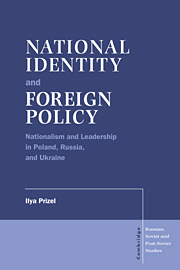Book contents
- Frontmatter
- Contents
- Preface
- Introduction: statement of arguments
- 1 National identity and foreign policy: a dialectical relationship
- 2 Polish identity 1795–1944: from romanticism to positivism to ethnonationalism
- 3 Poland after World War II: native conservatism and the return to Central Europe
- 4 Polish foreign policy in perspective: a new encounter with positivism
- 5 Russia's national identity and the accursed question: a strong state and a weak society
- 6 Russian identity and the Soviet period
- 7 Russia's foreign policy reconsidered
- 8 Ukraine: the ambivalent identity of a submerged nation, 1654–1945
- 9 Ukraine after World War II: birth pangs of a modern identity
- 10 Foreign policy as a means of nation building
- 11 Conclusion: national identity and politics in the age of the “Mass-Man”
- Index
- Cambridge Russian, Soviet and Post-Soviet Studies
11 - Conclusion: national identity and politics in the age of the “Mass-Man”
Published online by Cambridge University Press: 18 December 2009
- Frontmatter
- Contents
- Preface
- Introduction: statement of arguments
- 1 National identity and foreign policy: a dialectical relationship
- 2 Polish identity 1795–1944: from romanticism to positivism to ethnonationalism
- 3 Poland after World War II: native conservatism and the return to Central Europe
- 4 Polish foreign policy in perspective: a new encounter with positivism
- 5 Russia's national identity and the accursed question: a strong state and a weak society
- 6 Russian identity and the Soviet period
- 7 Russia's foreign policy reconsidered
- 8 Ukraine: the ambivalent identity of a submerged nation, 1654–1945
- 9 Ukraine after World War II: birth pangs of a modern identity
- 10 Foreign policy as a means of nation building
- 11 Conclusion: national identity and politics in the age of the “Mass-Man”
- Index
- Cambridge Russian, Soviet and Post-Soviet Studies
Summary
It is the task of education to give each human being a national form, and so direct his opinions and tastes that he should be a patriot by inclination, by passion, by necessity. On first opening his eyes a child must see his country, and until he dies, must see nothing else.
Jean-Jacques RousseauPatriotism is stronger than class hatred and usually stronger than any kind of internationalism.
George OrwellWhen mass opinion dominates the government there is a morbid derangement of the true functions of power. The derangement brings about the enfeeblement verging on the paralysis of the capacity to govern.
Walter Lippmann“Mass-man's” nationalism in the post-modern age
The prevalent belief of the last few decades, that nationalism and national identity are the products of an intellectual elite's ideas having been coopted by a cynical political elite, had led scholars to believe that nationalism would wither away with the rise of democracy and education. This “withering away” never materialized. Today, national identity remains the key marker of political identification. The popular notion of the 1970s popularized by Jurgen Habermas that Germans limit themselves to Verfassungs Patriotismus devoid of a historically understood national consensus was swept away by the short-lived waves of popular nationalism when Germany reunited on the basis of a historic national identity. In fact, the growing internationalization of modern politics has resulted in the progressive alienation of the population from many political institutions leading to an even greater reliance on “national” identity.
- Type
- Chapter
- Information
- National Identity and Foreign PolicyNationalism and Leadership in Poland, Russia and Ukraine, pp. 404 - 427Publisher: Cambridge University PressPrint publication year: 1998



